Results
-
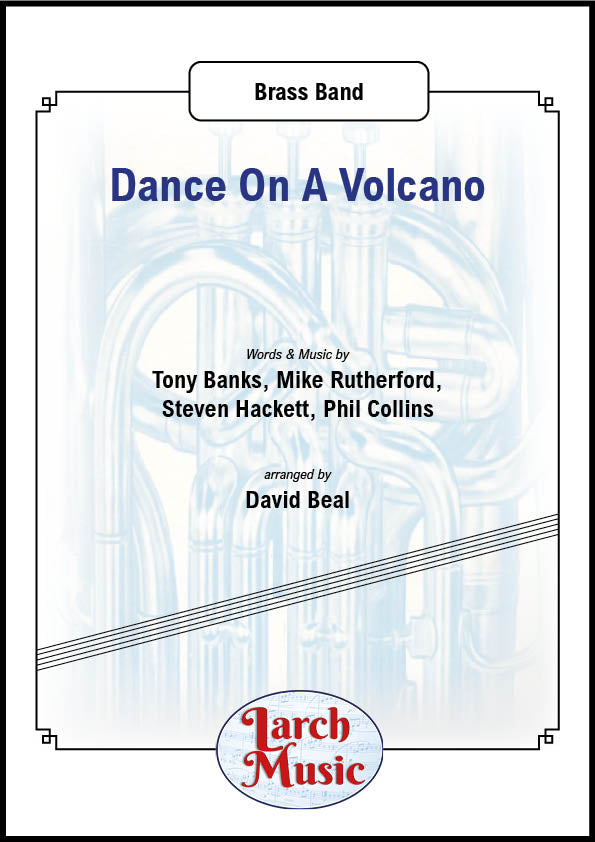 £35.00
£35.00Dance On A Volcano - Brass Band Sheet Music Full Score & Parts - LMAM012 - Phil Collins, Tony Banks, Mike Rutherford & Steven Hackett - David Beal
COMPOSER: Phil Collins, Tony Banks, Mike Rutherford & Steven HackettARRANGER: David BealCLICK HERE TO PURCHASE - THIS ARRANGEMENT IS ONLY DOWNLOADABLE FROM -Dance On A Volcano (arr. David Beal) Sheet Music | Steven Hackett | Brass Band (sheetmusicdirect.com)A Trick of the Tail is the seventh studio album by English progressive rock band Genesis. It was released on 13 February 1976 on Charisma Records and was the first album to feature drummer Phil Collins as lead vocalist following the departure of Peter Gabriel. It was a critical and commercial success in the UK and U.S., reaching No. 3 and No. 31 respectively. The opening track, "Dance on a Volcano", was the first song written for the album. Rutherford felt that, in contrast to the material on The Lamb..., it was easy to write, and was intended to show how Genesis would move forward. Now available for Brass BandAny purchases of this Item cannot be made from this listing please click on the link above - Any purchase using this site will be refundedAbout Digital DownloadsDigital Downloads are downloadable sheet music files that can be viewed directly on your computer, tablet or mobile device. Once you download your digital sheet music, you can view and print it at home, school, or anywhere you want to make music, and you don't have to be connected to the internet. Just purchase, download and play!PLEASE NOTE: Your Digital Download will have a watermark at the bottom of each page that will include your name, purchase date and number of copies purchased. You are only authorized to print the number of copies that you have purchased. You may not digitally distribute or print more copies than purchased for use (i.e., you may not print or digitally distribute individual copies to friends or students).
In Stock: Estimated dispatch 3-5 working days
-
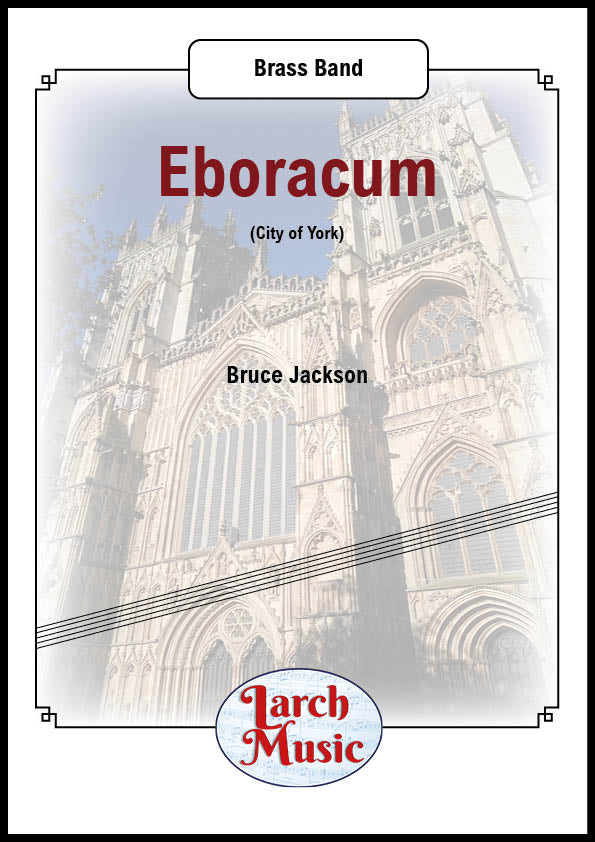 £25.00
£25.00Eboracum (Bruce Jackson) - Brass Band Sheet Music Full Score & Parts - LM426
COMPOSER: Bruce JacksonBrass Band Sheet Music Full Score & PartsA brand new march for brass bandEboracum was a fort and later a city in theRoman province of Britannia. In its prime it was thelargest town in northern Britain and a provincial capital.The site remained occupied after the decline of theWestern Roman Empire and ultimately developed into thepresent-day city of York, in North Yorkshire, England.Two Roman emperors died in Eboracum:Septimius Severus in 211 ADandConstantius Chlorusin 306AD.LM426 - ISMN : 9790570004263
In Stock: Estimated dispatch 3-5 working days
-
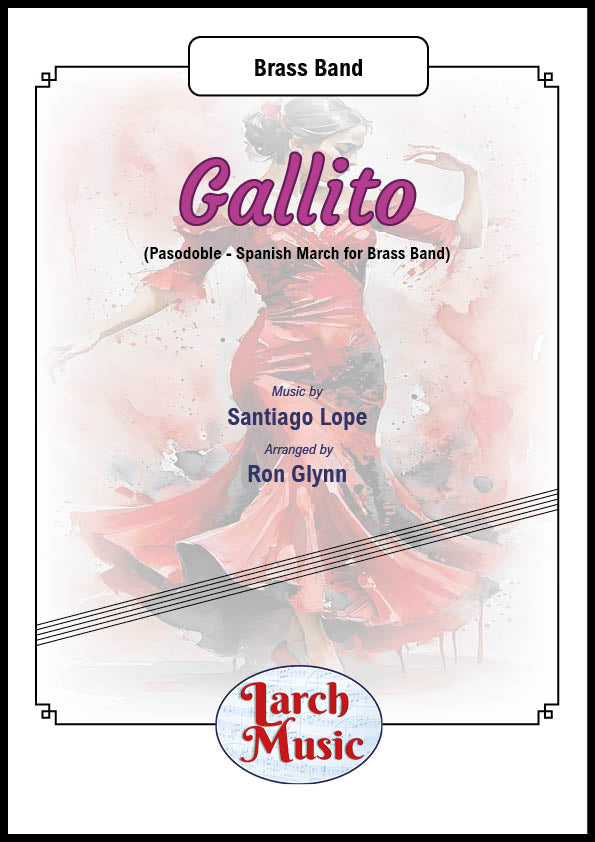 £30.00
£30.00Gallito (Santiago Lope arr. by Ron Glynn) - Brass Band Sheet Music Full Score & Parts - LM498
COMPOSER: Santiago LopeARRANGER: Ron GlynnBrass Band Sheet Music - Full Score and PartsProgramme NotesPasodoble for Brass BandThe newspapers of Valencia requested that Santiago Lope compose a pasodoble for a featured bullfight to be held at the local plaza de toros on June 29, 1905. Outdoing himself, he wrote not one, but four Pasodobles, one for each featured matador. These were: "Dauder" for Agustin Dauder, "Angelito" for Angel Gonzalez, "Vito" for Jose Manuel Perez and above all his masterpiece "Gallito" ("The little Cock") for Jose "Joselito" Gomez Ortega. As bullfighters often use nicknames in Spain, he used these popular names for most of the titles. Among the toreros featured in Valencia, "Joselito" Gomez Ortega was the most outstanding bullfighter, as he is "...comunmente aceptado como major torero de todos los tiempos" accepted as "most famous torero of all times" in Spain.LM498ISBN : 9790570004980
In Stock: Estimated dispatch 3-5 working days
-
 £25.00
£25.00Halcyon - Brass Band - MM020 - Tim Middleton
COMPOSER:Tim MiddletonA great new march from Tim MiddletonCommissioned for Busselton Brass Band' s 150th AnniversaryDuration: 3:22Brass Band Concert MarchThe Busselton Brass Band was founded in 1871 and celebrated its 150th anniversary in 2021.Named in honour of the whale-ship that shipwrecked in Geographe Bay in 1844, the march opens with a stately introduction and the main melody mimics the rise and fall of the ocean waves around the Busselton Jetty and town.The bass solo is inspired by the town's whaling and fishing history, and then returns to the original melody.The trio changes into 2/4 after the initial 6/8 contrasting the early years of Busselton and the more recent tourism and vineyard history. The trio also has a counter melody second time through to honour the band members who fought in World War I and II.At the end of the trio a D.C. to restate the opening themes, then a rousing finish at the end of the Bass Solo.A must for your summer concerts!
In Stock: Estimated dispatch 3-5 working days
-
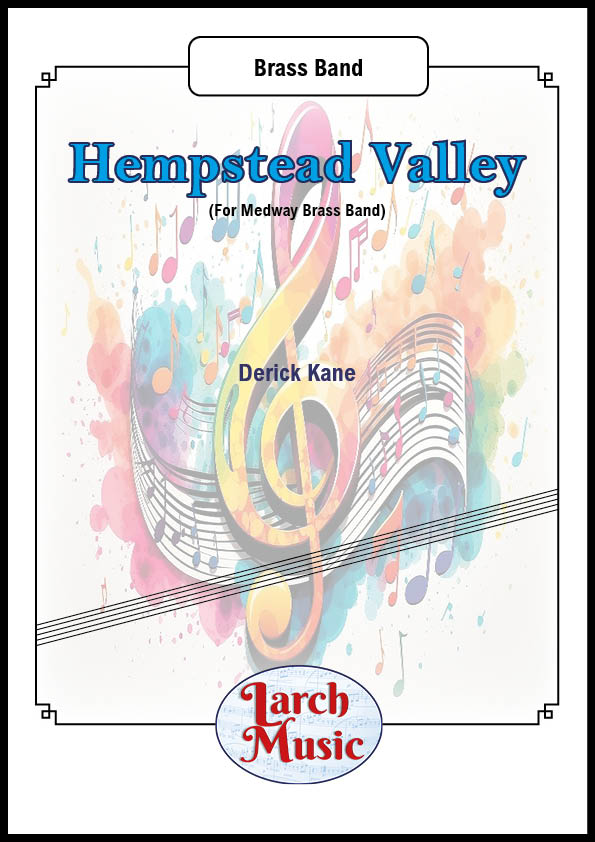 £25.00
£25.00Hempstead Valley - Brass Band Sheet Music Full Score & Parts - LM555 - Derick Kane
COMPOSER: Derick KaneA great addition to the brass band repertoire from the pen of Derick KaneAn original march for brass band in a lively and upbeat style.Would suit for an own choice entertainment contest marchWritten for The Medway Brass BandLM555 - ISMN : 9790570005550
In Stock: Estimated dispatch 3-5 working days
-
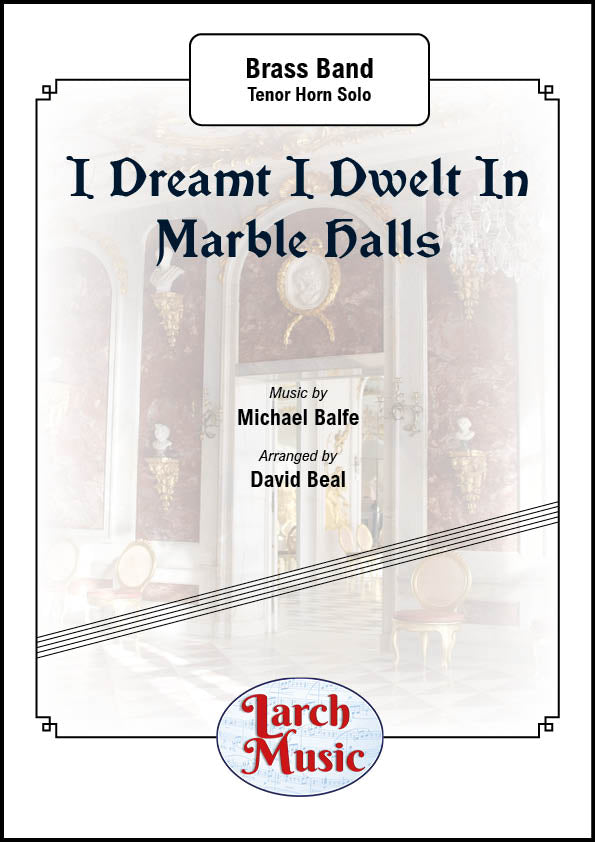 £25.00
£25.00I Dreamt I Dwelt In Marble Halls (Michael Balfe arr. by David Beal) - Eb Tenor Horn & Brass Band Full Score and Parts - LM011
COMPOSER: Michael BalfeARRANGER: David BealBrass Band Music Full Score and PartsThe haunting solo from The Bohemian Girl.Beautifully arranged here for Tenor Horn with Brass Band Accompaniment.Arranged in a theme with a variation style solo.Would suit most bands and a great way to show of the lyrical playing of the soloist"I Dreamt I Dwelt in Marble Halls", or "The Gipsy Girl's Dream", is a popularariafromThe Bohemian Girl, an 1843operabyMichael William Balfe, with lyrics byAlfred Bunn. It is sung in the opera by the character Arline, who is in love with Thaddeus, a Polish nobleman and political exile.ISMN - 9790570000111
In Stock: Estimated dispatch 3-5 working days
-
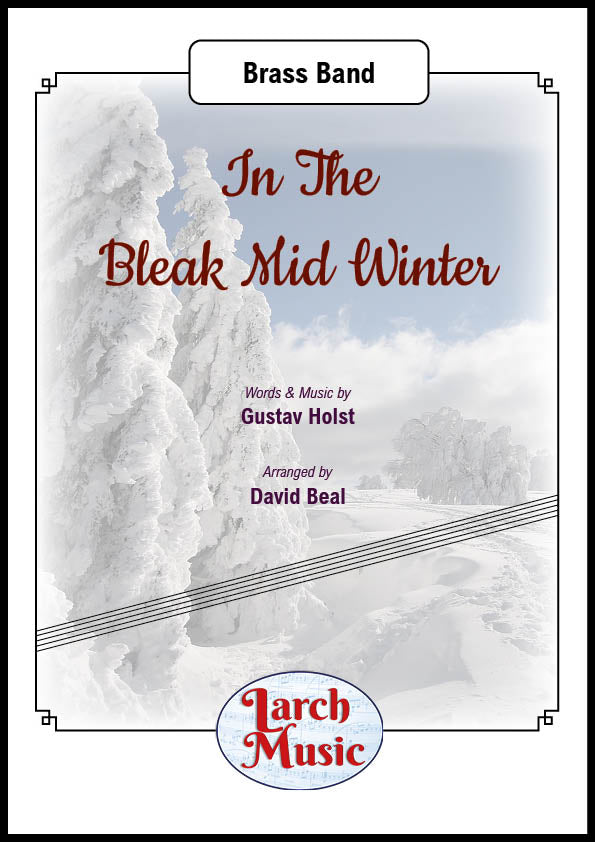 £25.00
£25.00In The Bleak Mid Winter - (Gustav Holst arr. David Beal) - Brass Band Sheet Music Full Score & Parts - LM600 - Gustav Holst
COMPOSER: Gustav HolstARRANGER: David BealA fantastic and haunting arrangement of the Gustav Holst tune "In The Bleak Mid Winter". A full band arrangement with solos from Solo Cornet and Flugel, with interjections from Repiano Cornet, 1st Baritone and Euphonium. This arrangement was specially written for The Shepherd Group Brass Band who recorded it for their Christmas CD.This arrangement is available now!Suitable for Youth section bands upwardsCD Available fromhttp://www.shepherdgroupbrassband.co.ukBrass Band Sheet Music Full Score & PartsLM600 - ISMN : 9790570006007
In Stock: Estimated dispatch 3-5 working days
-
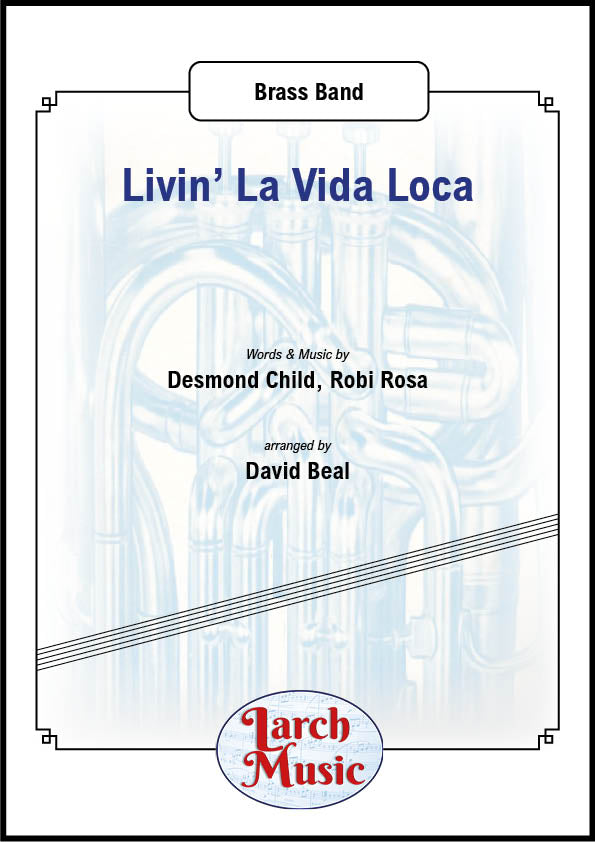 £30.00
£30.00Livin' La Vida Loca - Brass Band Sheet Music Full Score & Parts - LMAM015 - Desmond Child & Robi Rosa - David Beal
COMPOSER: Desmond Child & Robi RosaARRANGER: David BealCLICK HERE TO PURCHASE - THIS ARRANGEMENT IS ONLY DOWNLOADABLE FROM -Together In Electric Dreams(arr. David Beal) Sheet Music Brass Band"Livin' la Vida Loca" (transl. "Livin' the Crazy Life") is a song recorded by Puerto Rican singer Ricky Martin for his fifth studio album and English-language debut, Ricky Martin (1999). The song was written by Draco Rosa and Desmond Child, while the production was handled by the latter. It was released to radio stations by Columbia Records as the lead single from the album on March 27, 1999. A Latin pop and dance song with elements of salsa, surf, and ska, it is about an irresistible, particularly sinister, wild woman who lives on the edge, seducing others into her crazy world. The song received acclaim from music critics, who complimented its lyrics and danceable rhythm. It was ranked as the best 1990s pop song by Elle, and was listed among the Best Latin Songs of All Time by Billboard.Scored here for British Brass Band.Any purchases from this site cannot be made please click on the link above - Any purchases will be refundedAbout Digital DownloadsDigital Downloads are downloadable sheet music files that can be viewed directly on your computer, tablet or mobile device. Once you download your digital sheet music, you can view and print it at home, school, or anywhere you want to make music, and you don't have to be connected to the internet. Just purchase, download and play!PLEASE NOTE: Your Digital Download will have a watermark at the bottom of each page that will include your name, purchase date and number of copies purchased. You are only authorized to print the number of copies that you have purchased. You may not digitally distribute or print more copies than purchased for use (i.e., you may not print or digitally distribute individual copies to friends or students).
In Stock: Estimated dispatch 3-5 working days
-
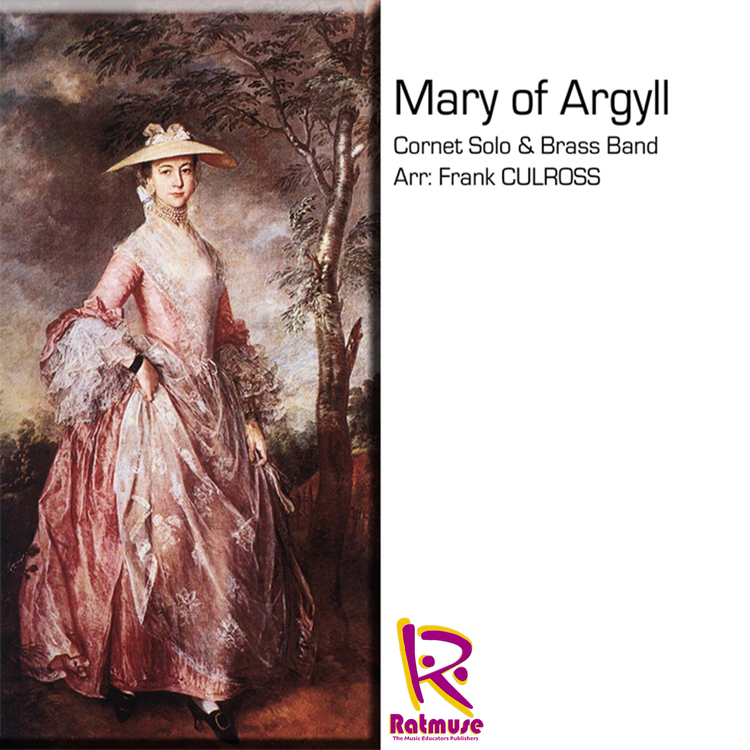 £30.00
£30.00Mary of Argyll - Bb Cornet & Brass Band - Frank Culross
COMPOSER: Frank CulrossFrom the pen of Frank Culross comes this beautiful setting for solo cornet and brass band of the tranditional Scottish tune Mary of Argyle. Originally arranged for the 11 year old (now professional Cornet player) Ian Culross, it has been expanded and developed into a lyrical masterpiece for Brass Band.CLICK HERE TO HEAR THIS PIECE - Mary Of Argyll (Solo Cornet & Brass Band) arr: Frank Culross
In Stock: Estimated dispatch 3-5 working days
-
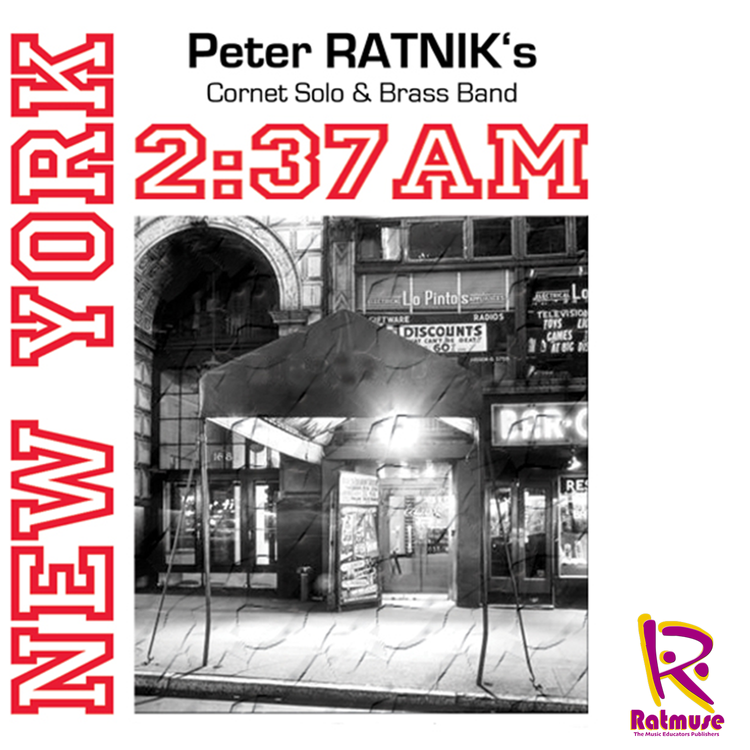 £30.00
£30.00New York 2:37AM - Bb Cornet & Brass Band - Peter Ratnik
COMPOSER: Peter RatnikFor Cornet Solo and Brass BandWritten in the style of jazz great, Miles Davis, New York 2:37am by Peter Ratnik will transport your audience to the dark streets of New York for a ride of their lives. This a great programmatic work and is ideal for any concert or entertainment contest.CLICK HERE TO HEAR THIS PIECE - New York 2:37am for Cornet Solo & Brass Band by Peter Ratnik
In Stock: Estimated dispatch 3-5 working days










